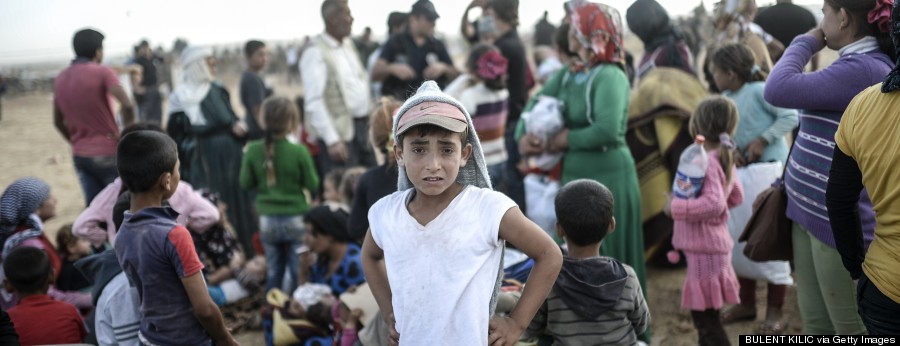The large-scale displacement of so many and the movement of the Kurdish fighters into Syria reflected the ferocity of the fighting in the northern Kobani area, which borders Turkey. Militants of the extremist Islamic State group have been barreling through the area for the past three days, prompting Kurdish leaders to plead for international help.
Civilians seeking safety began massing on the Turkish border on Thursday. Turkey did not let them in at first, saying it would provide them with aid on the Syrian side of the border instead. By Friday, it had changed its mind and started to let in several thousand.
The numbers grew quickly as more entry points opened, and by late Saturday afternoon, more than 60,000 had poured across the frontier, Turkish Deputy Prime Minister Numan Kurtulmus said.
Even by the standards of Syria's bitter war, it was unusual for so many refugees to flee in such a short time. Their numbers add to the 2.8 million Syrians who have become refugees in the past three years, and another 6.4 million who have been displaced within their own country — nearly half of Syria's pre-war population of 23 million.
Many of those who came across Saturday cradled young children or carried them on their shoulders. Kurtulmus said some refugees were staying with relatives, while others took shelter in schools or tents.
"Kobani is facing the fiercest and most barbaric attack in its history," said official Mohammed Saleh Muslim, head of Syria's powerful Kurdish Democratic Union. The groups' members dominate the Syrian Kurdish group known as the YPK, which is fighting the Islamic State militants.
"Kobani calls on all those who defend humane and democratic values ... to stand by Kobani and support it immediately. The coming hours are decisive," he said.
On Friday, the president of Iraq's largely autonomous Kurdish region, Masoud Barzani, warned that the militant group's attacks on the Kobani area "threaten the whole entirety of the Kurdish nation."
The battle over Kobani is part of a long-running fight between the Islamic State group and Syria's Kurds that has raged across a band of Syrian territory stretching along the Turkish border from the north to the far northeast, where large numbers of Kurds live. The clashes are one aspect of Syria's broader civil war — a multilayered conflict that the U.N. says has killed more than 190,000,
The YPK is viewed with suspicion by many Syrian rebels and their Western supporters because of perceived links to President Bashar Assad's government. That may be changing, however, as Kurdish fighters battle alongside some Syrian rebel groups against the Islamic State in northern and eastern Syria.
NATO member Turkey is wary of the group, which it believes is affiliated with the Kurdish PKK movement, a Kurdish movement that has waged a long and bloody insurgency in southeast Turkey.
Several hundred Kurdish fighters streamed into the Kobani area from Turkey, said the Britain-based Syrian Observatory for Human Rights. Kurdish official Nawaf Khalil also confirmed the movement of fighters into Syria.
At least some of the volunteers looked to be PKK fighters, while others appeared to be eager civilians, according to Kurdish officials who insisted on anonymity because they weren't authorized to speak to reporters.
Some 600 PKK fighters also crossed from Iraq into Syria, heading toward Kobani, said a military official in Iraq's northern Kurdish region. That official also spoke on condition his name not be used because he wasn't authorized to speak to journalists. The PKK have a base in the Qandil mountains in the Kurdish region of Iraq.
Ethnic Kurds dominate a mountainous region that straddles Iran, Iraq, Syria and Turkey.
Syrian Kurdish fighters had been successfully fighting off the militants for the past two years. They even clashed with the Islamic State group's fighters in northern Iraq, carving a safe passage for thousands of embattled Iraqis of the Yazidi minority, whom the militant group sees as apostates.
But the tide changed in September as Islamic State group fighters began employing more powerful weaponry they seized from Iraqi soldiers who fled the militants' advance in June.
The U.S. has yet to launch any airstrikes in Syria to stem advances by Islamic State fighters, but airstrikes in Iraq have helped Kurdish fighters there and the Iraqi army stem attacks by Islamic State forces.
U.S. Central Command reported five airstrikes against militants on Friday and Saturday, including one southwest of Baghdad that destroyed an Islamic State group boat carrying supplies across the Euphrates River. The four other strikes were northwest of Haditha, targeting armed vehicles, checkpoints and guard outposts.
The U.S. has now conducted 183 airstrikes across Iraq since the military action began in early August.
Original Article
Source: huffingtonpost.com/
Author: AP | By DIAA HADID and SUZAN FRASER

No comments:
Post a Comment